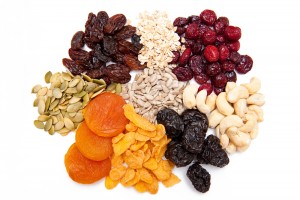 Kind, LLC received a rude awakening from the FDA when it notified the popular snack-maker that it was violating numerous federal regulations by allegedly misbranding four popular products. Kind is known for its widely-popular snack bars which are marketed as “wholesome,” “tasty,” and “convenient.” FDA’s warning prompted even more problems for Kind as the first class action was filed against it just three days later, mirroring FDA’s warning.
Kind, LLC received a rude awakening from the FDA when it notified the popular snack-maker that it was violating numerous federal regulations by allegedly misbranding four popular products. Kind is known for its widely-popular snack bars which are marketed as “wholesome,” “tasty,” and “convenient.” FDA’s warning prompted even more problems for Kind as the first class action was filed against it just three days later, mirroring FDA’s warning.
Kind’s labels contained nutrient-content claims that were purportedly unqualified given the bars’ ingredients and nutritional values. Four varieties (Kind Fruit & Nut Almond & Apricot, Kind Fruit & Nut Almond & Coconut, Kind Plus Dark Chocolate Cherry Cashew + Antioxidants, and Kind Plus Peanut Better Dark Chocolate + Protein) were allegedly misbranded because they were improperly labeled, among other things, as “healthy.” FDA warned that the products failed to meet the necessary requirement to qualify as “healthy” according to its definition of the term.
In the first class action filed on April 17, 2015, plaintiff Brandon Kaufer alleged he paid a premium for the four varieties of Kind bars subject to FDA’s warning, and based his allegations off of FDA’s letter to Kind. The complaint alleges violations of both federal regulations as well as California’s state consumer protections statutes. Kaufer is not alone. To date, two other proposed class actions have been filed containing similar allegations—another in California and one in New York.
There are two noteworthy implications of FDA’s letter to be considered in litigation. First, FDA’s action against Kind demonstrates that it is carefully monitoring products and holding companies to a high standard. Companies who pursue the “primary jurisdiction” defense (a defense that FDA is the appropriate entity to regulate labeling—not the courts) can now point to FDA’s exercise of its enforcement against Kind to strengthen its argument that FDA is taking an active role in regulating food labeling.
Second, the facts of this case demonstrate the need for “common sense” in an era in which consumers are bringing seemingly incessant claims regarding labeling and advertising in the ever-popular class action field. Despite FDA’s position that Kind bars are not “healthy,” due to the fat-content of the bars, this finding was largely based on the inclusion of ingredients that are widely considered healthy—nuts. Kind, which posted a response to FDA’s letter on its website, noted other seemingly healthy foods, such as avocados, eggs, and salmon, which are not “healthy” according to FDA. Few can argue, however, that these popular “super foods” are not healthy. Companies should seek early dismissal of claims, such as those against Kind, when common sense reveals the frivolous nature of such suits. Consumers’ lack of common sense should not be pardoned, as courts have already recognized. Federal courts dismissed actions against manufacturers of Froot Loops and Cap’Crunch with Crunchberries brought by customers who claimed they were misled to think that the sugary breakfast cereals actually contained real fruit.
The FDA letter can be seen as both a blessing and a curse in the food industry. It serves as a strong warning to companies to label with caution because FDA is taking a proactive role in enforcing definitions, which also may add credence to arguments that the primary jurisdiction doctrine should be invoked in this realm. On the other hand, FDA’s action undoubtedly prompted litigation against Kind. It is hard to argue that if it were not for FDA’s notice that the bars were not “healthy,” Kind would not have been subject to three class actions regarding the labeling in less than a week. It is also possible that other companies currently labeling products as “healthy” may now face suits after FDA brought attention to the term. Companies must strictly adhere to FDA’s regulations and be fully informed of all the terms and related definitions regardless of whether they agree with FDA’s definitions of terms, such as “healthy.”

